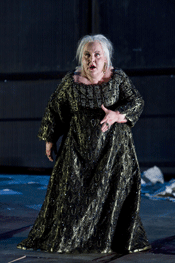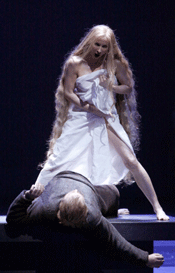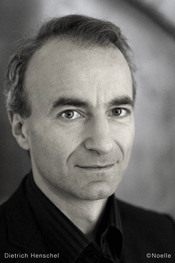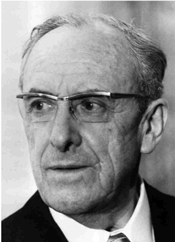It was, for example, an ordinary Monday late in the season at Berlin’s Staatsoper. On stage was an Elektra new two years ago. Even with Deborah Polaski in the title role one expected at most a solid but routine performance. How wrong one can be!
This, it turned out, was an Elektra light years beyond the highest expectations that one might have — or have had, in every way: cast, orchestra. conductor and production team made this an evening that packed an unprecedented wallop — even for someone with 60 years of Elektras behind him.
Elektra has long been Polaski’s favorite and signature role. She first sang it, one reads, in 1984 on her 35th birthday. Since then she’s been on stage in the work — sometimes in concert — over 300 times.
And on May 25 it was, of course, Polaski who made the Staatsoper Elektra a soul-shattering experience. She’s a tall, well proportioned woman of infinite energy. Even after 100 minutes singing at emotional extremes almost without a break, there was no sign of fatigue.
 Jane Henschel as Klytemn‰stra [Photo by Clive Barda for Royal Opera House]
Jane Henschel as Klytemn‰stra [Photo by Clive Barda for Royal Opera House]
The audience was near collapse from the wrenching performance, but Polaski — exuberant in relishing the murder of mother Klytemn‰stra and step-father Aegisth — seemed capable of singing the entire opera again.
Polaski speaks of herself as a member of a functional family who thus has special insights into the dysfunctional household of these mythic Greeks.
In a recent interview she stressed that we know nothing of these characters earlier in their lives. Elektra, for example, might have once had a tender and loving mother in Klytemn‰stra and even in their heated confrontation in the opera might long again for such warmth.
It the kind of thinking that accounts for the intense profundity of Polaski’s portrayal. Great as she was on this evening, however, Polaski was almost upstaged by American mezzo Jane Henschel who took the tormented Klytemn‰stra through successive stages of despair, anxiety and dementia.
In the States, Henschel’s departure from the stage in hysterical laughter would have evoked wild applause, and even in Berlin one felt that the staid German audience was fighting the temptation to acclaim the singer‘s achievement.
Anne Schwanewilms was an unusually virginal sister Chrysothemis, and ageing Reiner Goldberg an impressive Aegisth.
In supporting roles, however, it was young German bass-baritone Hanno M¸ller-Brachmann who was a third star of the evening. He portrayed brother Orest as a totally autonomous individual who arrives with the single purpose of double murder and walks towards it essentially unperturbed by the fate of his sister. This, in turn, left Elektra doubly pathetic as she realized that she had failed to give him the axe that had killed father Agamemnon and that she had consecrated as the weapon of revenge.
Director Dieter Dorn focused perceptive attention both on music and text and eschewed all theatrical trappings. And conductor Michael Boder made clear that the Staatskapelle, recently returned from its 10-concert New York Mahler cycle, is one of the world’s great orchestras.
More than in any of his other operas it is in Tannh‰user that Richard Wagner drew a clear line between a good girl and a bad one. The eponymous knight hero wallows first in Venus’ cesspool of seething sexuality, while virginal Elizabeth pines in vain for his affection.
 Nadja Michael as Venus
Nadja Michael as Venus
Yet the whore-virgin dichotomy does not hold — especially not when the two women are portrayed by a single singer, as was the case at the Deutsche Oper here on May 31. As Venus Germany’s Nadja Michael, famed elsewhere as a nude Salome, was a double for Lady Godiva. She was cloaked solely in copious knee-length blond locks, otherwise teasingly covering herself with a somewhat diaphanous white cloth. But as she moved toward transcendence as Elizabeth, Venus’ blond hair fell again from her head. But then it was only Elizabeth who had any understanding of Tannh‰user’s Act Two praise of sensuality to which his puritanical contemporaries responded with such horror.
The current DO production, new last January, did little to clarify matters. Director was Kirsten Harms, controversial general director — Intendantin — of the DO. Harms’ major mentors were the late Ruth Berghaus and Achim Freyer, mastermind of the current production of Wagner’s Ring des Nibelungen at Los Angeles Opera. (Both Berghaus and Freyer served apprenticeships in Bert Brecht’s Berlin Ensemble, where the concept of didactic theater was developed.) Harms’ production is a collage of brilliant — and original — ideas, but like so much of today’s *Regieoper* (a concept sometimes translated as “Eurotrash”) its many parts do not add up to a meaningful whole. And one can only marvel at a budget that makes such a staging possible.
Central to it was a stage that can be raised and lowered even with the company’s magnificent full chorus on it. Elizabeth’s “beloved hall” is peopled with a troop of armed men that bring to mind China’s terracotta warriors. It turns out, however, that they are mere props — tin Men of Oz, as it were — that then rise above the stage, where they remain suspended at various levels throughout the second and third acts. The pilgrims of Act Three, returning ill from Rome, are confined to a full stage of hospital beds, among which Elizabeth seeks her errant knight. (Did Harms perhaps have AIDS in mind?)
Interesting, to be sure — but did it all throw new light on Tannh‰user? One rather had an image of Harms backstage — the kid in the toy shop — gleefully pushing buttons to raise and lower the stage. Happily, all this was offset by the musical excellence of the May 31 performance.
The chorus, the work of William Spaulding, is one of Berlin’s major musical glories and it brought new awareness to the immense role played by the ensemble in this work. And the chorus had its equal in the DO orchestra, conducted by French-born Philippe Auguin, who early in his career served as an assistant to Herbert von Karajan and Georg Solti.
 Dietrich Henschel [Photo by Noelle]
Dietrich Henschel [Photo by Noelle]
Although Michael was mesmerizing in her double role, the evening was stolen vocally by Dietrich Henschel, a late replacement for an ailing Markus Br¸ck. Germany’s Henschel, a baritone often viewed as the successor to Dietrich Fischer-Dieskau, brought a depth to Wolfram von Eschenbach that left one wondering why Elizabeth did not respond to his wooing rather than holding out for the redeemed Tannh‰user of husky, Colorado-born Scott MacAllister.
After two decades with several German companies MacAllister has only recently moved into the heroic Fach. His is at best an adequate voice, and in a production focused so sharply on the visual an unlikely lover. In addition to the splendor of his voice and his interpretation of Wolfram, Henschel is well remembered as Don Giovanni at Berlin’s Komische Oper a few seasons ago. He sang the first act of the Mozart opera clad largely in white Jockey’s.
A new production of Tales of Hoffmann at Berlin’s Komische Oper is always of special interest, for Walter Felsenstein, who founded the company in 1947, made the Offenbach work a signature piece.
Indeed, Felsenstein’s 1958 staging of Hoffmann was the sensation of the final pre-Wall seasons in this then-divided city, when art-oriented West Berliners had two items at the top of their wish-list — both of them in the East of the city: a ticket to the Berlin Ensemble, whose master Bert Brecht had died only in 1956, and one to Felsenstein‘s Hoffmann at the Komische Oper.
 Walter Felsenstein
Walter Felsenstein
And although a half-century later that Hoffmann is vivid in the memory of those who saw it, others are today unaware of Felsenstein’s achievement not only in staging the opera, but in preparing an edition of it that gave the work the stature that it now enjoys in the international repertory.
For Offenbach died without leaving the world a definitive edition of this score that elevated him to a level above the operetta composer as which he was first famous.
Yet there is no doubt much in the Hoffmann currently on stage at the KO that would cause Felsenstein to blush, for the East Germany that supported his theater so handsomely was a prudish society that would have winced at the open sexuality of Thilo Reinhardt’s production that was new two years ago.
Reinhardt moved Hoffmann to the present, staging all five act in a single setting by Paul Zoller that was easily transformed to accommodate the changing locales of the story.
True to Felsenstein’s concept of opera as music theater, the KO assembled a cast astonishing in its combination of physical appearance and vocal splendor.
Best of the lot was Cornelia Gˆtz, who played Olympia as a Marilyn-Monroe look-alike in blond wig and a heavy fur coat, under which she wore very little. Tatjana Gazdik was a mellow-voiced Antonia, while Karolina Gumos fell below the standard of her colleagues as Giulietta.
Andreas Conrad was a less-than-ideal Hoffmann, for his somewhat strident tenor was alien to the illusion-ridden Romantic that this figure is.
Nonetheless, the performance on May 30 was an evening of the high entertainment that confirmed the often-encountered opinion that the KO is the most adventurous and interesting of Berlin’s three opera houses.
Francois Xavier Roth conducted the superb KO orchestra with elan. Costumes were by Katharina Gault. (Newsreel footage of Felsenstein’s 1958 Hoffmann is available, by the way, in the 12-DVD documentation of the director’s work issued by ArtHaus a year ago.) [N.B. [Click here for Opera Today’s review](http://www.operatoday.com/content/2009/01/walter_felsenst.php).]
A disquieting aspect of musical life in Berlin is the number of empty seats encountered at many events. At the May 31 performance of Tannh‰user at the Deutsche Oper, for example, the second balcony was half empty, and in the front rows of the orchestra dozens of seats went unsold.
At the Komische Oper, famous for its provocative stagings, empty seats abound despite the fact that it is by far the cheapest of Berlin’s three opera houses and that generous discounts prevail. Could this be in any way related to the fact that the KO still sings all operas in German?
And even a mostly-Wagner concert by Simon Rattle and the Berlin Philharmonic on May 28 was not sold out. This is especially sad for those who knew Berlin decades ago when there was never an empty seat anywhere. Indeed, many performances then were sold out by subscription at the outset of the season.
One hesitates to read the handwriting on the wall, for here too the audience is aging, and the interest in classical music among the young — although markedly stronger than in the States — is declining. Add to this the fact that Germany also is haunted by the world-wide financial crisis. One hears of budget cuts everywhere.
Yet behind all this looms a larger cause for alarm. It is still the vast amount of public money invested in them that makes Germany’s musical organizations unique — and great. How long will the taxpayer who never attends an opera be willing to continue such support?
Wes Blomster
image=http://www.operatoday.com/Polaski_Elektra_Paris_2005.gif
image_description=Deborah Polaski as Elektra [Photo by Eric Mahoudeau]
product=yes
product_title=Berlin: City of Three Operas
product_by=
product_id=Above: Deborah Polaski as Elektra [Photo by Eric Mahoudeau]